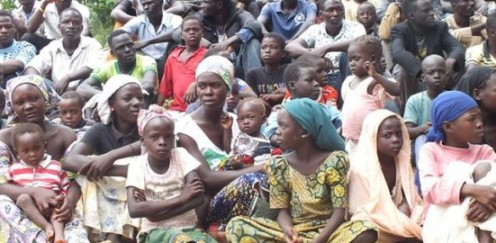By Ifeoluwa Esther Ademoyewa
Every year, on October 11, Nigeria joins the rest of the world to observe the International Day of the Girl-Child.
It is a day that is set aside to highlight issues and challenges that affect young girls and the need for government to create an enabling environment for the development of the girl child.

The girl child is a female offspring between the ages of zero to eighteen (0-18) years. This period covers the crèche, nursery, primary and secondary education in the life of a girl child.
Many girls in Nigeria are not given the opportunity of formal education. Girls between the ages of 12 and 14 years are in many instances considered old enough for marriage.

implication of this is that such girls are exposed to very high health risks and are deprived of their rights to education.
They are condemned to be illiterates forever.
Other factors affecting the girl child include religious dictates, cultural stereotyping of the woman’ roles and status, poor family background and disability.
Formal education is very essential for the girl child. Investing in a girl’s child education will lead to the formation of enlightened families, good society and development of the nation.

Hence the slogan “if you educate a boy, you educate an individual but if you educate a girl, you educate a nation”.
Also, according to a Chinese proverb, education is the best legacy to give a child because “giving your child a skill is better than giving him one thousand pieces of gold”.
Educating the girl child produces mothers who are educated, who will in turn educate their own children.
The Child’s Right Act 2003 recognizes the rights of a Nigerian child and provides for the care and protection of the child. It also provides for children with disabilities to enjoy their rights fully.

Investing in girl-child education is vital to driving development and growth in the country.
This is why I recommend that the Federal and State governments should invest more in the establishment of ‘girls only’ secondary and technical schools across the nation, particularly more in the Northern part of Nigeria where the problem of the girl child is more prevalent.
About 10.5 million Nigeria children aged 5-14 years are reported to be out of school and out of this number there are twice as many girls as boys.
Establishing more of Federal Government Girls Colleges across the nation, for example, will significantly improve girl child education in Nigeria.

The Unity Schools established for girls were to be at the forefront of improving female education and prepare young girls for the future. We certainly need many more of such schools to ensure equal access to education.
The National Policy on Education stipulates that access to education is a right for all Nigerian children regardless of gender, religion and disability.
There are benefits in having many more girls only secondary schools and governments should have it as part of its core agenda in the education of the girl child.
Girls’ schools allow the girls to take the center stage in school affairs.
By not having the boys in these schools, there will be greater opportunity for the girls to occupy every role in activities that shape their future.
Not only will the girls have many avenues for self-development, they will also have better opportunities for self-expression and leadership roles to play.

Girls’ schools that are established specifically for the purpose of educating girls will unlock the enormous potentials and power in being a girl. She will learn necessary skills and acquire knowledge to succeed in life.
The advantage of having more girls only schools is that it will provide greater opportunity to attend tertiary institutions after their secondary school education.
This implies that we will have more women engineers, doctors, lawyers, teachers, journalists and so on. We will have many more women who are bold, socially independent and as smart as they can be.
They become more able to speak up and be reckoned with in all spheres of socio-economic development.
One of the most important deliverables to a girl child is self-confidence and self-belief and these qualities are easily delivered by girls only schools.
Girls’ schools diminish the stereotyping of the girl child as to what professions are considered as ‘male professions’ or ‘female professions’.
Girls in girls only’ schools are free to follow their inclinations without hindrances.
Studies have shown that girls who attend ‘girls only schools’ are more likely to study science subjects such as Physics, Mathematics, Chemistry and Further Mathematics up to their ‘A’ level than their counterparts in mixed schools.
Girls’ schools create environment where girls take charge and put themselves forward. Every girl has opportunities to exhibit leadership skills as a school prefect, house prefect, head girl, sports captain and so on.
They learn how to accept responsibilities, how to inspire and lead others. They are better prepared and ready to enter the real world of co-education in the universities, polytechnics and other tertiary institutions.
Consequently, they are better able to face work and life having acquired the set skills and confidence to succeed.
In conclusion, I reiterate that having many ‘girls only’ secondary schools in Nigeria will be a life line in solving the problems of having many girls out of school.
I hope that the Federal and State governments will take this as a challenge and also support the parents by making ‘girl child’ education compulsory and free, especially in parts of the country where the girl child is more abused and deprived of emancipation.


